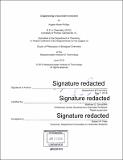Chaperoning viral protein evolution
Author(s)
Phillips, Angela Marie, Ph. D. Massachusetts Institute of Technology
DownloadFull printable version (24.48Mb)
Other Contributors
Massachusetts Institute of Technology. Department of Chemistry.
Advisor
Matthew D. Shoulders.
Terms of use
Metadata
Show full item recordAbstract
Preventing viral pandemics and developing effective antiviral therapeutics demands understanding the molecular mechanisms that both potentiate and constrain viral evolution. The rapid evolution of viruses is mediated in part by their high mutation rates, enabling resistance to antiviral drugs, seasonal vaccines, and innate and adaptive immune responses. Fortunately for us, the same mutations responsible for resistance are often biophysically deleterious to viral proteins. Thus, viral evolution is inherently constrained by the proper folding of viral proteins into functional, stable conformations. In cells, protein folding and homeostasis are assisted by complex networks of chaperones and quality control machinery. Though the evolutionary implications of most chaperones and quality control factors remain unexplored, the HSP90 chaperone can buffer and potentiate the phenotypic effects of mutations in endogenous client proteins in bacteria, fungi, plants, and other eukaryotic organisms. Viruses acquire mutations at a rate several orders of magnitude above that of the aforementioned organisms, yet they do not encode any machinery to assist destabilized protein variants to their folded, functional conformations. However, viral proteins are known to interact with host chaperones and quality control machinery. My graduate work has focused on determining whether and how host proteostasis machinery modulates viral protein evolution. First, I employed a serial passaging approach to evolve influenza in host cells with remodeled proteostasis capacities, revealing that cytosolic host proteostasis capacity is indeed a critical determinant of influenza evolutionary trajectories. This work motivated systematic quantification of influenza protein mutational tolerance upon perturbation of host proteostasis, for which I applied deep mutational scanning to comprehensively profile the mutational tolerance of influenza nucleoprotein and hemagglutinin in modulated cytosolic and endoplasmic reticulum (ER) folding environments, respectively. The nucleoprotein work provides the first experimental evidence that host chaperones can enhance the accessibility of biophysically deleterious, adaptive viral protein variants. The hemagglutinin work establishes evolutionary implications for the ER proteostasis machinery, and demonstrates that ER proteostasis mechanisms enhance mutational tolerance across the entire HA protein. Overall, it is clear that host chaperones and quality control machinery crucially impact viral protein fitness, and likely also impact the fitness of endogenous variants.
Description
Thesis: Ph. D. in Biological Chemistry, Massachusetts Institute of Technology, Department of Chemistry, 2018. Cataloged from PDF version of thesis. Vita. Includes bibliographical references.
Date issued
2018Department
Massachusetts Institute of Technology. Department of ChemistryPublisher
Massachusetts Institute of Technology
Keywords
Chemistry.